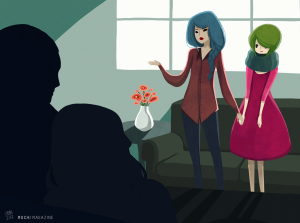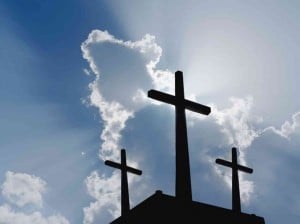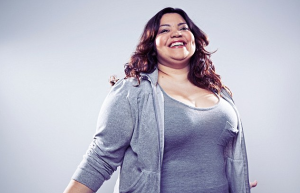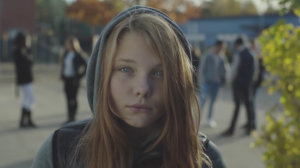
Source: Mochi Mag
“What are you afraid of? As long as you don’t mess it up, people will accept you.”
“How can you love yourself if you’re living a lie?”
“It’s a scary rite of passage, but it gets better!”
“You might lose your family, but if that happens, they didn’t love you for who you are.”
“We’ll never have equal rights unless you come out – you owe it to us!”
Sound familiar?
In the mainstream LGBTQIA+ narrative, coming out is the “happy ending” of our stories. It is self-actualization. It brings joyfulness, completion, and self-love.
And it’s true that coming out can, for some people, be a positive experience and an important political act.
But in reality, its context and implications vary hugely depending on the identity you are disclosing to yourself or others. It also varies depending on what other privileges and oppressions are in your life.
Perpetuating this mainstream coming-out narrative can bring a lot of problems, especially for people who don’t have mainstream privileges. It even hurts people who do. In fact, this narrative actually reinforces homophobia and transphobia.
Coming out is a deeply personal decision, and nobody needs extra policing or shaming around it.
Instead of focusing our attention on pressuring individual people to come out, people should broaden their focus towards resisting the system-wide oppression we all face.
Let’s unpack some of the harmful myths of the mainstream coming-out narrative.
Myth #1: You Are Dishonest If You Do Not Clearly Proclaim Your Identity
The idea behind this is that if you are closeted – or even if you do not regularly remind people of your (presence/lack of) gender or orientation – you are somehow deceiving others.
Underneath that concept is a heightened sense of entitlement to knowing about LGBTQIA+ identities. The public “has a right” to know about us – or we’re being dishonest.
Maybe this sense of entitlement exists to properly forewarn “normal” people — keep them safe or allow them to discriminate against. Maybe it’s because straight/cis people are fascinated with emphasizing our otherness. Maybe it’s because we are not, in fact, seen as human — our identities are not our own. They, apparently, belong to the straight/cis mainstream.
When this statement comes from fellow LGBTQIA+ people, they’re saying that we must be public about who we are in order to be an authentic part of the community. This is entitlement to others’ identities in another form. This time, our communities own our identities — not us.
However, we all fundamentally have a right to decide how to present ourselves to the world.
Choosing how, whether, and where to come out is a part of that right. Nobody else gets to decide how we should communicate ourselves to others.
Coming out is never a matter of honesty versus lying. It’s about how people automatically assume everyone to be part of a sexual, gender, or romantic majority.
Coming out wouldn’t be necessary if people didn’t automatically make that assumption. We only are expected to come out because we live in a world that caters to dominant genders and sexual/romantic orientations. The entire concept of coming out is a double standard.
The idea of dishonesty is just another way to control our identities.
The concept of dishonesty carries extra weight and tone for people who aren’t lesbian or gay.
Binary-identified trans people who are read as cis may or may not have an interest in disclosing a trans history after they’ve transitioned. That is fundamentally different than the concept of coming out in terms of sexual/romantic orientation.
And narratives and conceptions of dishonesty especially kill trans women, particularly trans women of color.
And no matter what monosexual people say, people who are bi/pan/another non-monosexual identity are not “hiding” a part of themselves depending on the a/gender status of the person they’re dating.
Myth #2: Everyone Faces the Same Problems When They Come Out
Coming out is dangerous. Being able to do so is often a matter of safety and privilege.
It certainly can also be very dangerous to continue to live as someone you’re not. Being able to express all of yourself can be healing, even lifesaving.
But coming out is not a requirement for being who you are, and it can have much higher costs for some people, especially people of color and other people facing intersectional oppressions.
The more types of oppression you face, the more exponentially dangerous and difficult it can be to come out.
And no, it doesn’t always get better for everyone – that’s a privileged narrative. At least, it won’t get better without everyone putting in some significant work into the systems that are oppressing us.
Myth #3: You Owe It to the LGBTQIA+ Community to Come Out
Many people say that coming out is a political responsibility — it makes people in the LGBTQIA+ community visible. Visibility, says the mainstream coming-out narrative, is recognition. Recognition is the first step in gaining rights. Gaining rights is safety.
But visibility is not the equivalent of safety. Especially not on an individual level.
Believing this ignores how visibility can be dangerous for many oppressed groups — just think about how racist or Islamophobic or transmisogynistic profiling relies the bigot’s ability to recognize the oppressed (as b. binaohan points out in decolonizing trans/gender 101).
It is often true that people can become less prejudiced when they know someone who is out — but we, too, often ignore the high price an out person pays for others’ educations. We can combat bigotry without shaming people for being closeted.
Instead, working to change systemic discrimination is more likely to keep us safe.
As Alok Vaid-Menon says, “What does it mean to make the onus of liberation on the individual (you! come out!) versus the system (you! eradicate the closet!)?”
This doesn’t mean that I think everyone should stay in the closet. Coming out can make an impact, and it is a very important part of many people’s lives.
But we shouldn’t be pressuring people to come out. Instead, we should be challenging the expectation that others are entitled to our identities.
No one should be demanding that people take on the risks of coming out. No one except you can make that decision. Your identity is yours, and no one else owns it.
You don’t owe anyone anything – especially not people who are ignoring your personal autonomy and safety by demanding that you come out.
A truly caring community works to make the world safer for everyone to be who they are – it doesn’t demand that you come out.
Myth #4: Coming Out Is a Required Rite of Passage on the Way to Happiness
Not everyone needs to be out to be happy.
Some people do, for sure. But for many, coming out is not a linear journey where endless unhappiness lies at the beginning and true bliss lies at the end. The reality can be much more complicated.
Coming out doesn’t guarantee happiness, just as staying closeted doesn’t guarantee unhappiness. Besides, people aren’t monolithically “out.” Coming out is ongoing, and people share different parts of themselves in different times and spaces.
This is not to invalidate the fact that for many people (myself included), it eventually feels like there’s no choice but to come out. Thanks to many intersecting privileges, my life fits that mainstream narrative in some ways. I can be out and comparatively safe. Although it did make many things harder, it also improved my life in many ways.
But to be clear, while this was true for me, this is not a universal truth.
Myth #5: There Is a ‘Right Way’ and a ‘Wrong Way’ to Come Out
The idea that there are better or worse ways to come out is rooted in the idea that if someone reacts badly to your coming out, then it’s your fault – not the fault of the person you’re telling.
This is victim blaming.
The people you tell are entirely responsible for their reactions. It doesn’t matter if you told them in a whisper or you told them while you were yelling angrily or if you told them with 100% calm and confidence and a toothpaste-ad smile to boot.
If someone is going to be a jerk, they’re probably going to be a jerk no matter how you tell them. The most confident coming-out won’t change that.
Too frequently, we are expected to take care of the feelings of the person we’re coming out to. Information about who we are is handled with infinite delicacy and told with painstakingly carefulness to try to keep our relationships from destruction.
But in (utopian) reality, no matter how you come out, the people around you should validate you. Not only should they affirm and respect who you are, they should be the ones checking in with you to be sure that you’re alright — not the other way around.
Of course, this is not the reality we live in. But it’s important to remember that someone else’s negative reaction is not your fault.
Myth #6: White Experiences of Coming Out Are Universal
The mainstream coming-out narrative ignores the impact of racism on someone’s identity and visibility – in addition to ableism, classism, and other oppressions.
Of course, this doesn’t mean that coming out is a useless concept for everyone facing multiple oppressions; there are a huge range of experiences and ideas on the concept of coming out.
However, it’s not something that fits everyone’s identities, cultures, or experiences. Acting as if it does erases many people.
I can’t speak for the coming-out experiences of people of color or immigrants, but I’m going to summarize and quote and link to some coming out narratives. There is definitely much more to add!
When someone is oppressed for their visible membership to another group, often the risks associated with the visibility of an LGBTQIA+ identity take on a different set of meanings and consequences.
binaohan talks about the entitlement that comes with demands to come out in decolonizing trans/gender 101:
“our ‘closets’ are much much much smaller than any white person’s (and it only shrinks with the more kinds of oppression you experience). because being a non-white body in this world, is to immediately be rendered available for public consumption…we are not entitled to the same level of body integrity and ‘privacy’ that white people are…
“the request to sacrifice my current communities, the communities to which i properly belong, just to fulfill some (imaginary) obligation to a community that regularly lets me know how much i don’t belong, seems ludicrous.
“What white queers don’t understand is that the entire mandate of racist assimilation in this country is about us being forced to give up our culture, tradition, and families…
“White folks do not understand how so many of us are not willing to leave our cultures for our queerness – how so many of us carry more complex identities than just our genders and sexualities….
“White queer politics relies on the expression of liberation as an individual and not collective process. [It relies] on us leaving our cultural homes in order to participate in the ‘movement.’
In addition, for immigrant families and communities, there are often added language and cultural barriers to cross.
This is not at all an exhaustive list of the ways in which coming out is centered on Whiteness. But hopefully you can tell that the benefits of coming out serve some parts of the LGBTQIA+ community more than others.
***
Instead of harping on the same tired coming-out narrative, recognize how intersectionality affects this process.
If you’re out, great! You deserve support and backup from those around you. Coming out can be a powerful personal and political act. Just don’t pressure or shame others.
If you don’t come out, are out in certain parts of your life, or you aren’t out yet, that’s also awesome.
We should be supporting everyone no matter what information they’ve told others about themselves. This shouldn’t be about entitlement to others’ identities; it should be about system-wide elimination of discrimination against LGBTQIA+ people.
As rainbowgenderpunk says, “Just existing is enough.” And there’s no right way to do it. For something that is too often a traumatizing “rite of passage,” there are a lot of exacting standards that go with it.
Let’s throw out those standards, support each other as individuals wherever we’re at, and focus on the work that will build a safer world for all of us.
[do_widget id=”text-101″]
Adrian Ballou is a Contributing Writer for Everyday Feminism. A genderqueer writer, artist, activist, and educator who does youth development work both inside and outside the classroom, they particularly enjoy writing and facilitating social justice education and youth organizing curriculum. To learn more about their consulting and speaking work, check them out here. In their free time, they cook lots of food, sing songs, make art, and practice their Spanish, Hindi, and Urdu. Read their articles here..
Search our 3000+ articles!
Read our articles about:
Our online racial justice training
Used by hundreds of universities, non-profits, and businesses.
Click to learn more




















